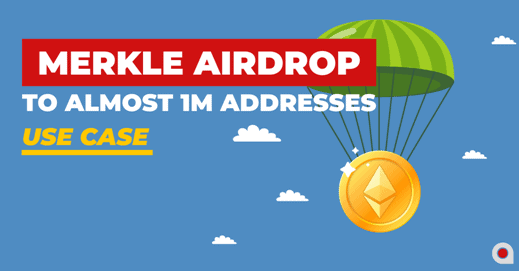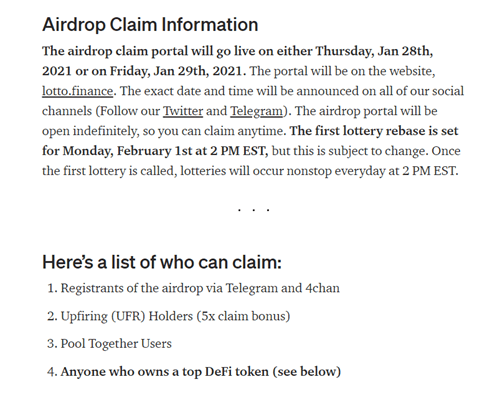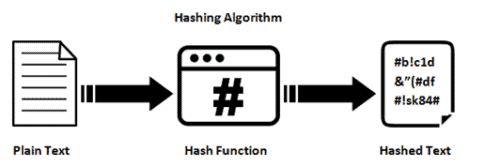
Unlike the traditional Airdrop for sending tokens to people, Merkle Airdrop is the new way to share tokens to many users on the Ethereum blockchain platform simultaneously. This process is efficient, cost-effective, faster, secure and makes it effortless for businesses to reach a large pool of their customers or users. Many token owners are leveraging this new technology for the distribution of their tokens. That’s why we encourage you to find out more in this article about how this process works.

Source:HackerNoon
The traditional Airdrop
The traditional airdrop method of token distribution is used by projects that try to penetrate the market by sending out their tokens to thousands of random addresses. Many of these address owners might not even be interested or aware of the existence of the project, and they consider it spam.
These spamming tactics of pushing small amount tokens on users is inefficient and wasteful. This is because most people having these tokens in their wallets cannot spend them since it is not economical considering the transaction cost of exchanging such a small amount of token.
The project owners using traditional Airdrop, on the other hand, also spend a lot of costs to maintain their network server due to the network load, increased transaction fees that come with an increased number of non-active users.
Also, large sums are paid to software developers for updating scripts that govern the distribution to prevent them from crashing. The baseline is that this method is not pleasant for project owners and users, hence the need for a novel approach to doing things, and that is why Merkle Airdrop comes as the game-changer.
What is Merkle Airdrop?
Merkle Airdrop is a smart contract used for bulk token distribution on the Ethereum network. Many believe this is a much better alternative to the traditional airdrops.
By developing a flawless algorithm, using Merkle Airdrop allows you to simultaneously solve multiple problems associated with an extensive directory of user addresses using a smart contract. It is currently impossible to add thousands of addresses to a smart contract and allow them to take action on the contract without the high cost of saving every single data byte on the blockchain.
To solve this problem, Project owners prevent sending tokens to random people on the smart contract, and the contract is programmed to verify if an address is whitelisted before a required action can take place.
The solution lies in the fact that the contract stores one number known as the Merkle-root, and the user or customer then confirms if the address is whitelisted. This process helps to verify the integrity of the data source.
Users of a particular token can also be informed on their platform or through social media that they have a specific amount of token that they can claim from the project, hence eliminating the issue of spam or gas fee.
The Lotto Finance Project Case study
Expert DeFi developers atapplicature have already implemented the Merkle Airdrop in a popular project known as “LOTTO” , a token for the lotto finance lottery. LOTTO is the first-ever lottery token and was distributed via Airdrop to DeFi users.
Our client collected over 900,000 unique addresses among a list of particular token holders on the lottery smart contract blockchain were whitelisted, with a sizeable number of the user users claiming the lotto finance token on their website. This also boosted the awareness of Lotto finance among people interested in the lottery.
We informed the lotto community through the airdrop alert (airdropalert.com). “Lotto People” know and monitor the website. We were able to create the first 100% decentralized lottery token on Ethereum. The goal was to extend the limit of what’s possible with smart contracts, tokens, and blockchain as a whole.

Lotto Token claim. Source: lottoFinance
The project owners were satisfied with the Merkle Airdrop algorithm’s success developed by blockchain DeFi developers from Applicature. Applicature stands out as a reliable development company to handle similar projects.
Hashing: The Merkle or hash tree
Hashing is the process of producing a fixed-size output from a variable-size input. This is achieved by using mathematical formulas known as hash functions (implemented as hashing algorithms).

Source: Network Encyclopedia
Merkle airdrop uses the hash tree to generate a whitelist of users who are allowed to receive tokens based on their awareness and interest in a project. Merkle tree is a cryptography solution in smart contracts that distributes tokens to specific users instead of randomly. Users have to ask for the token transfer to their wallet, and the transaction cost is shifted to the user.
The principle holds that users have to validate that their account is included in the list by carrying out a massive calculation on the client’s side and paying the transfer fees.
This benefits both the project owners distributing the tokens because they save cost and only verified users pay for and receive tokens. In contrast, users only purchase tokens they like on their wallets. This process creates an ecosystem of people who are interested in the project.
Advantages and disadvantages of Merkle airdrop
Here are some of the advantages and disadvantages of the Merkle Airdrop compared to traditional script-based distribution.
Advantages:
- Less ether is used for transactions requiring tokens even though the amount needed for gas depends on the size of the generated white list
- The client-side application performs all the necessary operations
- The launched smart contract does not require any support or surveillance by the programmer
- A straightforward deployment process
- Higher reliability
- Safety (Due to the integrity of the smart contract itself)
- This method enables you to integrate lists of practically any size with minimum storage use on the blockchain.
Disadvantages:
- The address list needs to be uploaded to a public resource.
- The client code will have to process all contact details in the white list and undergo quite resource-intensive calculations.
- It is a centralized process, and Decentralization is preferable.
- There is nothing hidden in this algorithm, and the intensive calculations of client-side applications offset the contract storage savings to verify that addresses belong to the list. This approach shows the difference between using smart contracts in contrast to traditional centralized systems.
Conclusion
The Merkle Airdrop approach offers many advantages over the traditional sending tokens, which are cumbersome, expensive, and time-consuming. The development by solidity developer DeFi and deployment of a Merkle Airdrop on your platform is actually not a big deal, even for a non-tech savvy person. Once our developers at Applicature help you with the smart contract, you can promote your DeFi project, and the whole process is easy to manage.
Check out our website and message us to know more about our exciting projects, and stay tuned for further updates.

 Mar 11, 25, Weekly: Crypto Rollercoaster – Bitcoin Dips, Trump’s Crypto Summit, and HUD’s Blockchain Experiment
Mar 11, 25, Weekly: Crypto Rollercoaster – Bitcoin Dips, Trump’s Crypto Summit, and HUD’s Blockchain Experiment